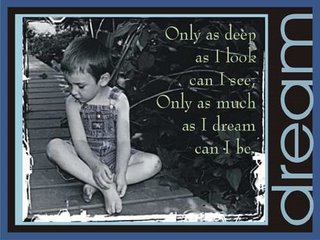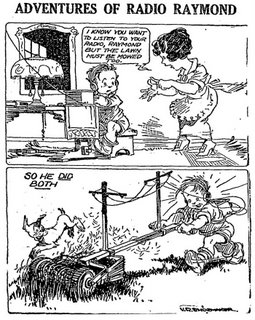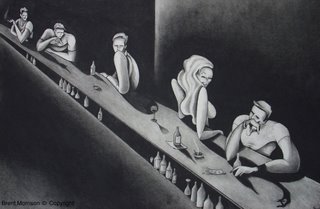What didn't the little girls understand?

The reason for the image at left is not to be gratuitous -- although, as far as gratuitousness goes, it ain't a bad image -- but to illustrate some questions that cannot help but arise as to where feminism sits in current context.
Women of a certain generation, mine for example, fought long, hard and quite legitimately to assume their place in the workaday world and society in general. Some of them no doubt went too far, and some of them still probably do, and for them the quest for equality really became an embracing of mysandry, and nobody was the better for that form of antagonism. Especially nice guys, like me, for example. But, for the most part, dedicated and thoughtful feminists mainly looked in the direction of equal treatment for equal skills, and to not have to suffer from the distressing omnipresence of so-called sexual harassment. "Nice tits, Miss Jones, now what did you want to see me about?" You know, that kind of crap.
Anyway, part of the process of getting away from old-fashioned division of the sexes was for women to become a bit more androgynistic in the way they attired themselves. Cleavage and high heels were largely out, and comfortable shoes and a buttoned, businesslike blouse became more the order of the business day. The belief was males in the workplace are going to take females a little more seriously if they are not devoting their time to looking down blouses or up skirts. Not that I ever did that. Oh, OK. I did, once in a while. I'm only human.
And, that is my point. We are all only human, males and females alike. And we are all, if we are straight, attracted to the opposite sex. But, ongoing titillation rarely gets the job done, consequently, beginning in the late 1970s and early 1980s, the corporate world brought in some pretty stringent rules about behavior and sexual harassment. They realized people would get more done if they weren't suffering from ongoing hormonal surges. It's all about bottom-line, folks. Ultimately, both the job and society became more pleasant places to inhabit for women. There were things we once said, and flirtations we once carried out that wouldn't be dreamed of today. What was acceptable banter in say 1968 would be as out-of-place in 2006 as, say, smoking in a grocery store. Which was also acceptable and legal in 1968, by the way.
But recently, there have been some changes in that, and a number of businesses North America wide are trying to find ways to combat young women who are not only inappropriately dressed for the business world, but they are slutbunny dressed for the business world. A Paris Hilton ambiance of low-cut tops, lowrider pants, remarkably short skirts, exposed thongs and other undies, and variations on such themes, has become increasingly ubiquitous workaday clobber for increasing numbers of young women. I qualify what I said earlier about such attire not being business suitable. It is business suitable, if you work for an escort service. Otherwise, it is club-wear in the 9-to-5 world.
Meanwhile, males are not expected to respond to these stimuli, because the harassment rules still apply in most businesses. What those who made the rules a few years ago, however, did not countenance, was that harassment was a two-way street. That is, no rules for suitable and non-provocative attire were set in place.
What to do? Some businesses have tried to introduce dress-codes, only to find that they are in violation of the basic human rights of the civilian world. Only the military can set stringent rules of attire. The military, and such safety-oriented callings as firefighting and police work.
What some of the more assertive young females have stated is that dressing in such a provocative manner is not only their right, but is also an effective way to get ahead in the workplace. That is, male superiors cannot overtly harass, but they can 'notice', and reward accordingly, regardless of talent. It's a ruthless world out there, so hooker-style gives a boost up the ladder, then hooker-style it shall be.
Meanwhile, the Gloria Steinems of the world can only cringe. How did it all come to this? What messages were lost or misinterpreted along the way?
Don't look towards vulgarity of style to pass quickly. Just check out the girls (not overtly if you are an adult male, you could get arrested) on their way to any junior high, and you realize that hooker-chic has a long way to go before it runs its course.














































